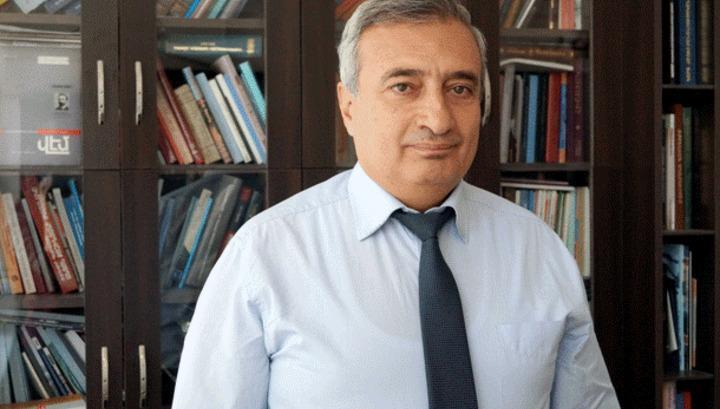
The card in our hand is bigger. we have all the possibilities to counter the enemy. Ashot Melkonyan
2023 was a very difficult year for the Armenian people. The loss of Artsakh was a big blow to the statehood of Armenia, but it cannot be said that all is lost. In a conversation with "Detq" correspondent, director of NAS History Institute, historian, academician Ashot Melkonyan mentioned this, emphasizing that 100 years ago, Armenia faced the same challenge.
"When I gave lectures about the years 1920-21, I told the students: God forbid that the interests of our enemy the Turks and our ally the Russians should coincide, and this is exactly what happened in our days. As a result, in 2020, we lost the entire southern part of Artsakh, and in 2023, all of Artsakh. Artsakh was depopulated within days. a phenomenon that has not happened in the history of Artsakh for thousands of years.
Even when a significant part of the Armenian population left the homeland after Shah Abbas's deportation in 1604 in the Ararat valley, this did not happen in Artsakh and Syunik, and there were certain manifestations of statehood there. I'm talking about the elites and the elites, thanks to which it was possible to oppose such a policy," said the historian.
Ashot Melkonyan stressed that the future is quite uncertain, but it is not only due to our actions, but it is the result of major geopolitical shifts. "We see that micro-wars are taking place, which can logically lead to the 3rd World War. like on the eve of the First World War, when the Turkish-Italian War happened, in 1911 the Balkan Wars happened, and after the so-called reconnaissance or proxy wars, the big war, the First World War, happened. The same thing happened on the eve of the Second World War. Even today, such a situation is not excluded, and we, at least, must understand that it is time to be united, because division will bring a new disaster to our people.
It is not a secret for anyone that Armenian statehood is in danger today, because if 4-5 years ago we had two statehoods and were proud that Artsakh and the Republic of Armenia are independent state entities, today it is a very difficult situation. However, this does not mean that everything is lost. nothing can be irreversible. We should not remove the issue of return from the agenda, especially since the enemy is putting forward the fake program called "Western Azerbaijan". It is from the genre of a fairy tale, another Azerbaijani fiction, which we have very serious fights to oppose. Let's not forget that according to the 1989 census, 486,000 Armenians lived in the territory of the Azerbaijan SSR, although it can be said that Artsakh de facto left Azerbaijan in February 1988, and this happened de jure in 1991.
Now, I think, the number one fight to answer the Turkish-Azerbaijani tandem is the question of our refugees, and the playing card in our hand is bigger than that of the Azerbaijanis. If they are talking about some artificial, inflated numbers, about 150-200 thousand Azerbaijanis, then in our case it is about half a million Armenians."
According to the director of the Institute of History, the circulating view that it is a wall situation is not true, there is a solution in all cases, and we have all the opportunities to counter the enemy. "We must do everything to restore the place and role of the Republic of Armenia with united forces. I definitely see a prospect for that, at least defensively. Azerbaijan's concern about why Armenia is re-arming, buying weapons from India or France shows that our enemy is worried. This is also evidenced by his speech, at least recently. They understand well that the resistance movement is potentially growing in Armenia."
Referring to the issue of the possible conclusion of the "peace agreement", Ashot Melkonyan noted that following the current processes, it can be assumed that there is disagreement between the parties on fundamental issues.
"Like most of the public, I have no idea what that document is all about. If that document is released and we get to know the contents, we will be able to speak more clearly. But if there was a problem of enclaves in that document, if there was a problem of "returning" Azerbaijanis to Armenia, not to mention the issue of providing an extraterritorial corridor to Azerbaijan through the territory of Zangezur according to the ill-fated November 9 agreement, that is a completely unacceptable option. However, since the signing is being delayed, I assume that the Armenian side finally understands that it is unacceptable for us to record any retreat due to these problems and allow the enemy to cross the red lines," said the academician, expressing his opinion that during this year such the possibility of signing the document is unlikely, given the disagreements on these fundamental issues.
On the other hand, the historian notes that if Azerbaijan does not abandon military rhetoric, talking about peace becomes ridiculous. "I think that the societies are not ready for it either, and with the example of the announcement of the ill-fated agreement on November 9, we have made sure that Azerbaijan does not follow the agreements. "Azerbaijan has violated all agreements, from prisoners to enclaves, so to talk now about the second document to be signed and to expect that Azerbaijan will fulfill its obligations is naive."
Add new comment